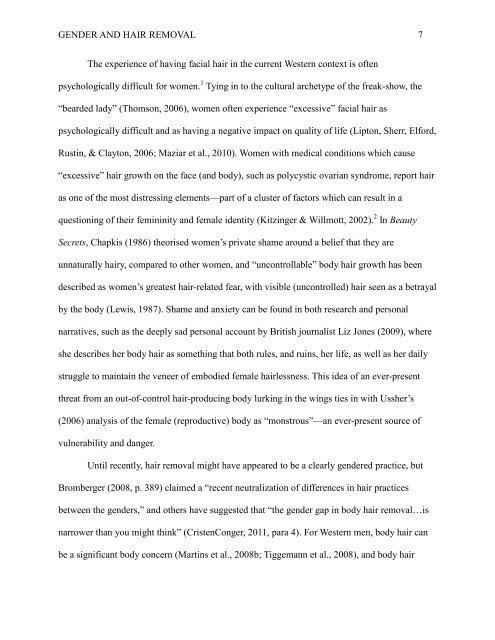Braun, V. , Tricklebank, G. and Clarke, V. (2013) It shouldnt stick out ...
Braun, V. , Tricklebank, G. and Clarke, V. (2013) It shouldnt stick out ...
Braun, V. , Tricklebank, G. and Clarke, V. (2013) It shouldnt stick out ...
You also want an ePaper? Increase the reach of your titles
YUMPU automatically turns print PDFs into web optimized ePapers that Google loves.
GENDER AND HAIR REMOVAL 7<br />
The experience of having facial hair in the current Western context is often<br />
psychologically difficult for women. 1 Tying in to the cultural archetype of the freak-show, the<br />
“bearded lady” (Thomson, 2006), women often experience “excessive” facial hair as<br />
psychologically difficult <strong>and</strong> as having a negative impact on quality of life (Lipton, Sherr, Elford,<br />
Rustin, & Clayton, 2006; Maziar et al., 2010). Women with medical conditions which cause<br />
“excessive” hair growth on the face (<strong>and</strong> body), such as polycystic ovarian syndrome, report hair<br />
as one of the most distressing elements—part of a cluster of factors which can result in a<br />
questioning of their femininity <strong>and</strong> female identity (Kitzinger & Willmott, 2002). 2 In Beauty<br />
Secrets, Chapkis (1986) theorised women’s private shame around a belief that they are<br />
unnaturally hairy, compared to other women, <strong>and</strong> “uncontrollable” body hair growth has been<br />
described as women’s greatest hair-related fear, with visible (uncontrolled) hair seen as a betrayal<br />
by the body (Lewis, 1987). Shame <strong>and</strong> anxiety can be found in both research <strong>and</strong> personal<br />
narratives, such as the deeply sad personal account by British journalist Liz Jones (2009), where<br />
she describes her body hair as something that both rules, <strong>and</strong> ruins, her life, as well as her daily<br />
struggle to maintain the veneer of embodied female hairlessness. This idea of an ever-present<br />
threat from an <strong>out</strong>-of-control hair-producing body lurking in the wings ties in with Ussher’s<br />
(2006) analysis of the female (reproductive) body as “monstrous”—an ever-present source of<br />
vulnerability <strong>and</strong> danger.<br />
Until recently, hair removal might have appeared to be a clearly gendered practice, but<br />
Bromberger (2008, p. 389) claimed a “recent neutralization of differences in hair practices<br />
between the genders,” <strong>and</strong> others have suggested that “the gender gap in body hair removal…is<br />
narrower than you might think” (CristenConger, 2011, para 4). For Western men, body hair can<br />
be a significant body concern (Martins et al., 2008b; Tiggemann et al., 2008), <strong>and</strong> body hair

















